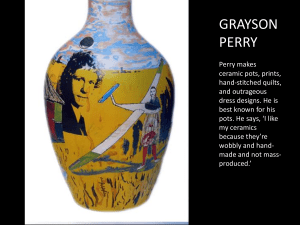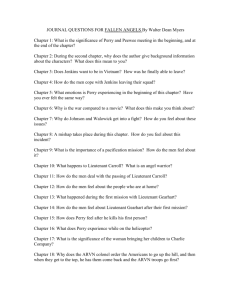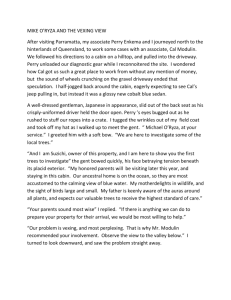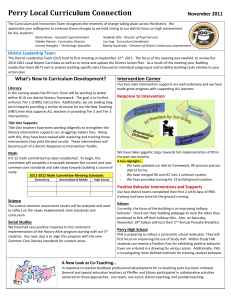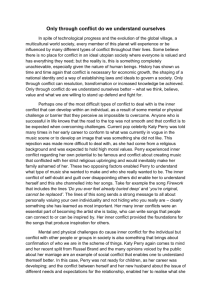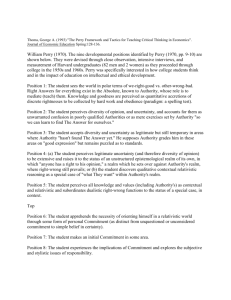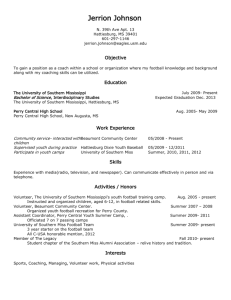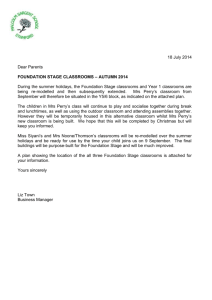In Cold Blood: Perry Smith's Destructive Metamorphosis
advertisement
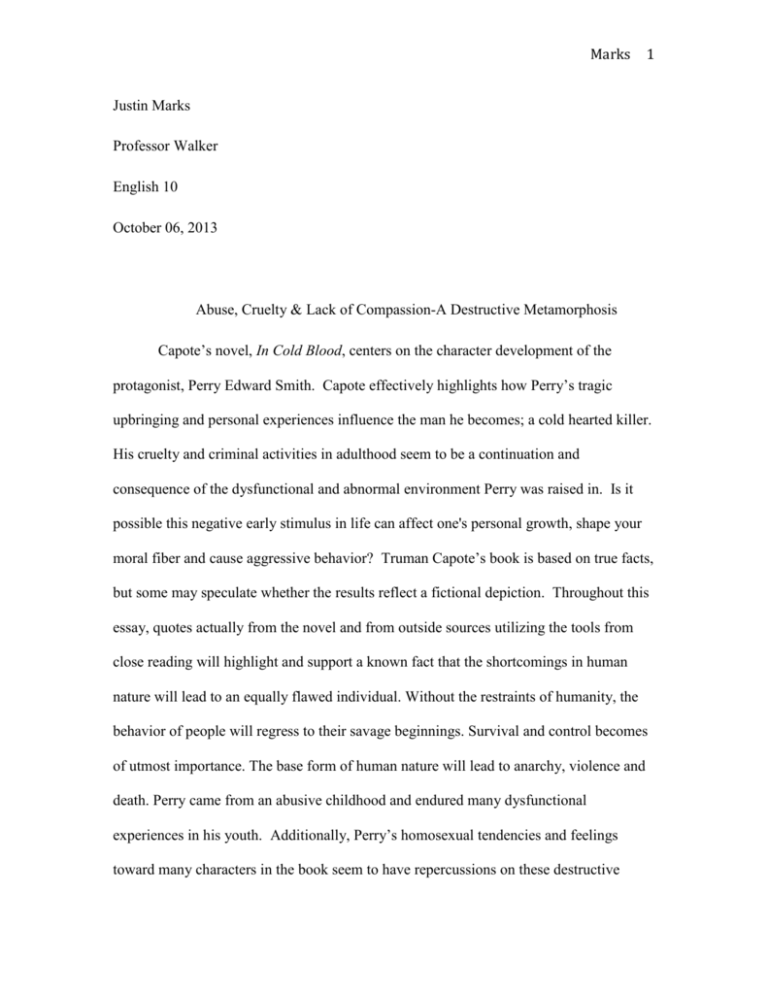
Marks 1 Justin Marks Professor Walker English 10 October 06, 2013 Abuse, Cruelty & Lack of Compassion-A Destructive Metamorphosis Capote’s novel, In Cold Blood, centers on the character development of the protagonist, Perry Edward Smith. Capote effectively highlights how Perry’s tragic upbringing and personal experiences influence the man he becomes; a cold hearted killer. His cruelty and criminal activities in adulthood seem to be a continuation and consequence of the dysfunctional and abnormal environment Perry was raised in. Is it possible this negative early stimulus in life can affect one's personal growth, shape your moral fiber and cause aggressive behavior? Truman Capote’s book is based on true facts, but some may speculate whether the results reflect a fictional depiction. Throughout this essay, quotes actually from the novel and from outside sources utilizing the tools from close reading will highlight and support a known fact that the shortcomings in human nature will lead to an equally flawed individual. Without the restraints of humanity, the behavior of people will regress to their savage beginnings. Survival and control becomes of utmost importance. The base form of human nature will lead to anarchy, violence and death. Perry came from an abusive childhood and endured many dysfunctional experiences in his youth. Additionally, Perry’s homosexual tendencies and feelings toward many characters in the book seem to have repercussions on these destructive Marks 2 decisions. Ultimately, as an audience, we witness Perry’s transformation from a pettycrime criminal to a brutal violent murderer. Throughout the story we learn a lot about Perry’s background, mental instability and the effects Perry’s crimes have on society. In Cold Blood illustrates that an individual with a violent and abusive childhood, such as Perry Smith, will ultimately become a harmful citizen to humanity. A close reading essay is one where you take quotes from the book and place them in your essay as concrete details that you use as evidence for your argument. Based off the scholarly article “The Art of Close Reading” from The Critical Thinking Community, we are allowed to pull quotes from the novel and outside resources as long as we refer to them throughout the essay. There are many instances throughout In Cold Blood where Capote discusses Perry’s abusive childhood, experience with abandonment and homosexual feelings that highlights the transformation he undergoes that exemplifies concrete details for my close reading essay. In addition, published critiques on this novel support Capote’s efforts to illustrate the correlation between social influence and personal development. The protagonist, Perry Smith, is a victim of an abusive environment that deprives a young man of his youth and humanity. Perry’s actions in the novel directly correlate to his childhood experiences and savage transformation. Typically, when people are abused in their formative years, they tend to become the abuser later in life because they are unable to reconcile their past with their desire for love, acceptance and normalcy. Hence, Perry reverts to violent behavior despite his perceived intelligence, calm and benign nature. This is supported by a psychiatrist’s statement about Perry, “He is suspicious and distrustful of others, tends to feel that others discriminate against him, and feels that Marks 3 others are unfair to him and do not understand him... his present personality structure is very nearly that of a paranoid schizophrenic reaction.'" (289-290). As the reader, we observe Perry’s inability to attune his personal opinion of himself with his brutal tendencies. One can surmise if Perry had not been exposed to a dysfunctional and abnormal lifestyle, he would not have acquiesced to the criminal and immoral society which resulted in the killing of the Clutter family; one of the most horrific murders in American history. We can blame Perry’s violent actions on his abusive childhood, being bullied as a result of having homosexual feelings, and Dick’s influence in transforming Perry from a petty-crime criminal to a violent murderer. The comment "...it was because he'd wanted Dick's friendship, wanted Dick to 'respect' him, think him 'hard', as much 'the masculine type' as he had considered Dick to be." (107) reveals Perry’s desire to emulate an individual he wants to impress; thereby, showing his lack of control over his own mind and emotions. Throughout the novel, as an outsider, we can see initially Perry is uncomfortable with his metamorphosis, but then we see his acceptance and rationale for his compulsive reality that completes the transformation; Perry becomes a hardened brutal killer. At an early age, Perry is abandoned by his mother and later ignored and rejected by his sister and father. As a result of this emotional abandonment, Perry develops feelings of distrust, insecurity and lack of self-worth. Capote effectively documents Perry’s sorrowful and lack of loving relationships by the statement, "Jimmy a suicide. Fern out the window. My mother dead. Been dead eight years. Everybody gone but dad and Barbara.'" (134). Unfortunately, Perry is denied an opportunity to cultivate loving kinships. Perry begins to feel that anyone he gets close to abandons him. His father and Marks 4 sister left him and his mother and other siblings all died tragically at different times in his life. Perry realizes his isolation from humanity and his inability to truly relate to others with his comment, “My acquaintances are many, my friends are few; those who really know me fewer still." (142). Clearly, Perry is unable to foster and sustain personal and social relationships. These abandonment characteristics cause an unhealthy personal development and a distortion of reality, which is illustrated with the quote, "As a child he had often thought of killing himself, but those were sentimental reveries born of a wish to punish his father and mother and other enemies. From young manhood onwards, however, the prospect of ending his life had more and more lost its fantastic quality." (195) An individual is bound to violent behavior without a foundation based on a trusting, nurturing environment, morals and a sense for compassion and worthiness. The underlining sexual connotations and eventual violent consequences are prevalent throughout the novel. The subtle repercussions are highlighted by Perry’s narrative, “Now, that's something I despise. Anybody that can't control themselves sexually." (236) and later he reminisces, "I remember my mother was 'entertaining' some sailors while my father was away.... And my father, after a violent struggle, threw the sailors out & proceeded to beat my mother. I was frightfully scared" (265). The sexual influence is obvious. Also, Conrad Knickerbocker notes in his New York Times book review, “The tragedy was existential. The murder was seemingly without motive. The killers, Perry Smith and Richard Hickock, almost parodied the literary anti-hero. Social dropouts filled with nausea, disillusioned romantics, they were the perfect loners. Their relationship, if not physical, was spiritually homosexual, similar to the exacted Freundschaft, bound in blood, of SS brothers’ reinforce this perspective. In addition, Guy Marks 5 Rocha points out, “Some critics of the book and first movie, speculated that Capote, openly homosexual and a product of a troubled youth, identified with Smith's shattered childhood and developed an attraction to him.”. Capote’s personal experiences do emphasize and reinforce the impact psychological orientation can have on an individual’s actions. However, despite the sentiment and influence of homosexuality, Perry is clearly responsible for his actions and should be held accountable. Certainly, Capote’s ability to relate to Perry provides a unique perspective on the significance of sexual predisposition. Perry’s actions have reduced him to a human shell acting on instinct, without emotion and oblivious to his personal destruction. His perceived fight for normality and aggressive behavior destroys his humanity, honor and sense of compassion. Nurturing relationships and compassion are definitely necessary to keep the darker side of human nature in line. When all elements of good disappear and abusive behavior emerges, Perry reverts to a more primitive part of his nature, and turns into a savage, and cruelty replaces decency. Guy Rocha’s comment, “Truman Capote's portrayal of Smith is strangely a sympathetic one that belies the fact that Perry's dysfunctional family life and violent sexual abuse in the service had helped to create a monster” supports this concept. Society’s high moral standards hold everyone together, and without humanity and compassion, Perry’s ideals, values, and basic ideas of what is right and wrong are forgotten and the evils of human nature emerge. Ultimately, Perry comes to the realization he cannot separate himself from his tragically embedded immoral fiber, which impacts the destructive effect on his humanity. Marks Work Cited Book Source Truman Capote. In Cold Blood. : Vintage International, 1965. Online Sources Conrad Knickbocker. The New York Times; Books; One Night on a Kansas Farm. January 16 1966 <http://www.nytimes.com/books/97/12/28/home/capote-blood2.html>. Guy Louis Rocha. State Library & Archives Truman Capote’s In Cold Blood: The Nevada Connection <http://nsla.nevadaculture.org/index.php?option=com_content&id=959&itemid=418>. 6

